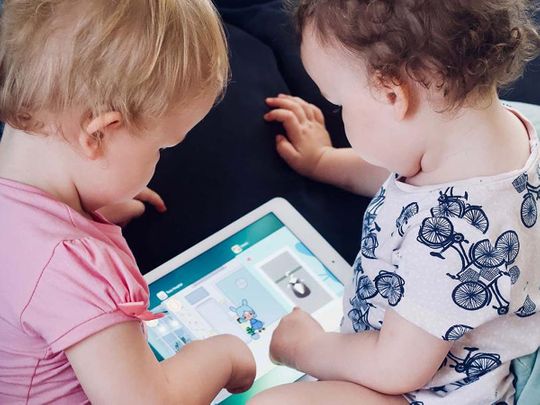
The digital age has given new generations of parents something extra to worry about: How much screen time is too much?
Physicians, teachers and psychologists generally agree that spending inordinate amounts of time immersed in computers, smartphones or social media can negatively impact a child’s developing mind and body.
A screen time study published recently in JAMA Pediatrics found a link between excessive screen time and later development milestones.
Other studies have associated digital overuse with teen depression, and the American Academy of Pediatrics has issued guidelines suggesting daily limits on screen time for different age groups.
“It’s the responsibility of the parents to get control of this and guide their children, from a young age, on the positives and negatives of screen time,” says Christine Kyriakakos Martin (www.youvegotthisparenting.com), an early education expert and author of You’ve Got This! Keys To Effective Parenting For The Early Years.
“Parents can often think it’s acceptable for a young child to spend a couple hours with an iPad, but the type of education the iPad game is providing isn’t always the type of learning most needed at that stage.”
Read more from Baby & Child: 'The rise of the #Instamum: Is your social media use putting your child in danger?'
Yet in this digital age - especially during the hot summer when there's a pandemic happening - it's unrealistic to expect that children have no screen time whatsoever. Martin has suggestions for how parents can manage screen time and decrease a child’s risk for screen-related health or developmental problems:
Distinguish screen time from play time
Play is a fundamental learning tool for young children, but parents, Martin says, should not think of screens as toys for play time. “When screen time is limited and separated from other types of play, parents show their children the importance of setting boundaries, using their imaginations, and being active.”
Get involved
Parents who engage with their children about on-screen activities can help them increase their communication skills and teach them how to navigate digital media.
“Parents can talk with their children about the videos they watch and games they play like they would discuss characters and plotlines in a book,” Martin says. “When there is parental engagement like this, a child’s vocabulary and literacy skills develop and family communication gets stronger.”
Make mealtimes screen-free
“Eliminate screens from the meal table, including when you’re out at a restaurant,” Martin says. “While it can be tempting to pack the iPads to have some adult conversation while you’re out to eat, doing this doesn’t teach your children about manners, properly engaging in conversation, or being mindful of other patrons.”
Set a good example
It will be harder for a child to disengage from screens if his or her parents are consistently looking down at their own phones or tablets. “Remember,” Martin says, “your children learn from your example. If they see you spending a lot of time with your face in front of a screen, they’ll also want to use technology at the same time. Try your best to save your time on social media for your lunch break, during nap time, or after your children have gone to bed.”
“Learning how to use screens, verbally communicate or socially interact will have a positive impact on language skills, relationships and overall health,” Martin says. “Spending time with their parents, learning through play is what young children need and want.”
Read more: If you use your smartphone in front of your child in the UAE, you're probably breaking the law'
Screen Time Guidelines for Different Ages
The American Academy of Pediatrics recommends the following:
- For children younger than 18 months, avoid use of screen media other than video-chatting. Parents of children 18 to 24 months of age who want to introduce digital media should choose high-quality programming, and watch it with their children to help them understand what they're seeing.
- For children ages 2 to 5 years, limit screen use to 1 hour per day of high-quality programs. Parents should co-view media with children to help them understand what they are seeing and apply it to the world around them.
- For children ages 6 and older, place consistent limits on the time spent using media, and the types of media, and make sure media does not take the place of adequate sleep, physical activity and other behaviors essential to health.
- Designate media-free times together, such as dinner or driving, as well as media-free locations at home, such as bedrooms.
- Have ongoing communication about online citizenship and safety, including treating others with respect online and offline.
Read more from Baby & Child: Dubai mums discuss: Is your little one getting too much screen time?








